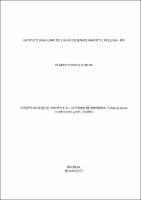Use este identificador para citar ou linkar para este item:
https://repositorio.idp.edu.br//handle/123456789/3579| Título: | Direito ao esquecimento e a liberdade de imprensa: colisão de direito no ordenamento jurídico brasileiro |
| Autor(es): | Silva, Cláudio Henrique |
| Orientador(es): | Pinheiro, Guilherme Pereira |
| Palavras-chave: | Direitos da personalidade;Liberdade de Informação;Liberdade de Informação;Direito ao esquecimento |
| Data de submissão: | 2022 |
| Citação: | SILVA, Cláudio Henrique. Direito ao esquecimento e a liberdade de imprensa: colisão de direito no ordenamento jurídico brasileiro. 2020. 27 f. Trabalho de Conclusão de Curso (Graduação em Direito) – Instituto Brasileiro de Ensino, Desenvolvimento e Pesquisa, Brasília, 2022. |
| Resumo: | O objetivo do presente trabalho é elucidar em quais ocasiões o direito ao esquecimento merece
se sobressair quando se encontrar em colisão com os direitos fundamentais que dizem respeito
à liberdade de expressão. Igualmente, esclarecer como o direito ao esquecimento, assegurado
pelo princípio constitucional da dignidade da pessoa humana, tem aplicabilidade no
ordenamento jurídico brasileiro. Ainda, analisar de que forma o conflito entre o direito à
personalidade, o direito à imagem, o direito à honra e à privacidade em detrimento do direito à
liberdade de expressão, liberdade à informação e liberdade de imprensa, é entendido na esfera
judicial brasileira e em quais situações o direito ao esquecimento deve prevalecer. O direito ao
esquecimento ou o direito de ser esquecido ou ainda, o direito de ser deixado em paz, deve ser
compreendido como um direito de não ser relembrado, quer em uma informação atual ou
mesmo em uma informação pretérita, um acontecimento do passado não deve causar
perturbação à vida presente, ainda que tal acontecimento seja reportado como verdadeiro.
Diante das Hipóteses há duas correntes: uma admite o direito ao esquecimento e que a resolução
de tal conflito se dê por meio da análise do caso concreto, ensinada pelo jurista Luiz Roberto
Barroso; há também uma corrente divergente, que não reconhece o Direito ao Esquecimento e
a prevalência do Direito a Liberdade de Informação com fundamento na Democracia, defendida
pela Doutora Denise Pinheiro. Portanto, pelo estudo realizado conclui-se que há o
reconhecimento do Direito ao Esquecimento no nosso ordenamento jurídico, que se dá através
da análise do caso concreto. |
| Abstract: | The objective of this paper is to elucidate on which occasions the right to be forgotten deserves to prevail when it is in collision with the fundamental rights that concern freedom of expression. Likewise, the aim is to clarify how the right to be forgotten, ensured by the constitutional principle of human dignity, applies to the Brazilian legal system. Still, we intend to analyze how the conflict between the right to personality, the right to image, the right to honor and privacy to the detriment of the right to freedom of expression, freedom of information and The objective of this paper is to elucidate on which occasions the right to be forgotten deserves to prevail when it is in collision with the fundamental rights that concern freedom of expression. Likewise, the aim is to clarify how the right to be forgotten, ensured by the constitutional principle of human dignity, applies to the Brazilian legal system. Still, we intend to analyze how the conflict between the right to personality, the right to image, the right to honor and privacy to the detriment of the right to freedom of expression, freedom of information and The objective of this paper is to elucidate on which occasions the right to be forgotten deserves to prevail when it is in collision with the fundamental rights that concern freedom of expression. Likewise, the aim is to clarify how the right to be forgotten, ensured by the constitutional principle of human dignity, applies to the Brazilian legal system. Still, we intend to analyze how the conflict between the right to personality, the right to image, the right to honor and privacy to the detriment of the right to freedom of expression, freedom of information andfreedom of the press, is understood in the Brazilian judicial sphere and in which situations the right to be forgotten should prevail. The right to be forgotten or the right to be forgotten or even, the right to be left alone, must be understood as a right not to be remembered, whether on current or even past information, an event from the past should not cause disturbance to the present life, even if such an event is reported as true. Given the Hypotheses there are two main currents of opinion: one that admits the right to be forgotten and that the resolution of such conflict takes place through the analysis of the specific case, shared by justice Luiz Roberto Barroso; and an opposing current that does not recognize the Right to Forgetfulness and the prevalence of the Right to Freedom of Information based on Democracy, defended by Denise Pinheiro. The study concludes that there is recognition of the Right to Oblivion in our legal system, which takes place through the analysis of the specific case. |
| URI: | https://repositorio.idp.edu.br//handle/123456789/3579 |
| Aparece nas coleções: | Trabalhos de Conclusão de Curso (Graduação) |
Arquivos associados a este item:
| Arquivo | Descrição | Tamanho | Formato | |
|---|---|---|---|---|
| TCC_ CLÁUDIO HENRIQUE SILVA _2020.pdf | 240.17 kB | Adobe PDF |  Visualizar/Abrir |
Os itens no repositório estão protegidos por copyright, com todos os direitos reservados, salvo quando é indicado o contrário.
